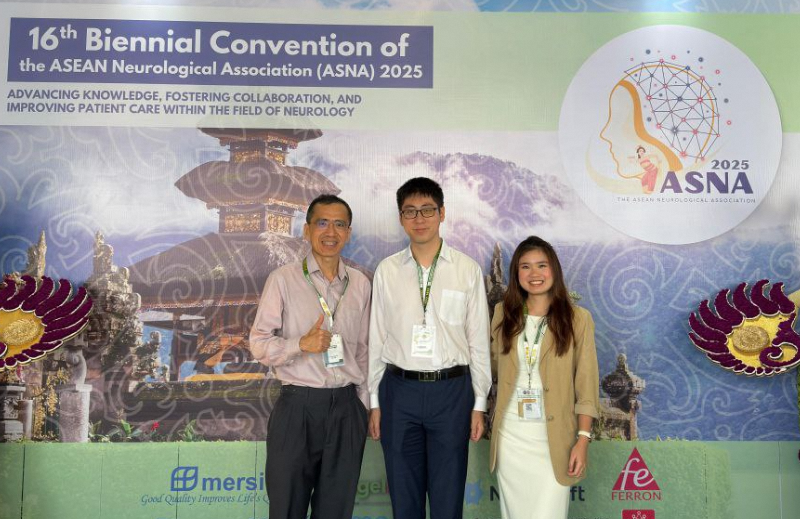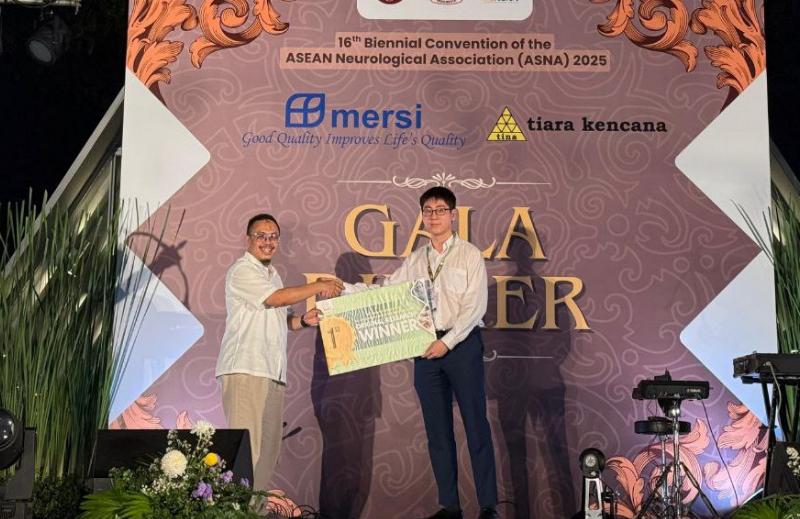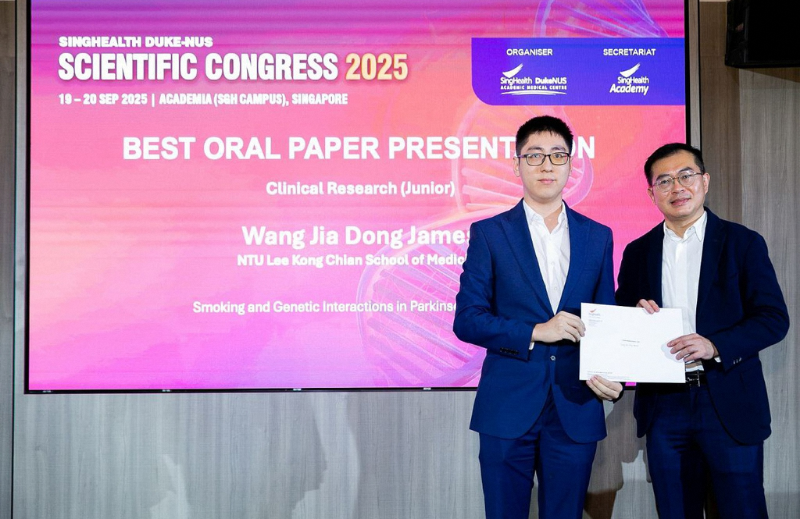National Neuroscience Institute will NEVER ask you to transfer money over a call. If in doubt, call the 24/7 ScamShield helpline at 1799, or visit the ScamShield website at www.scamshield.gov.sg.
Medical student's award-winning research on smoking and Parkinson's disease


James Wang (centre) with his NARA mentor, Prof Tan Eng King (left)
A medical student under NNI’s mentoring programme has won several awards for his study on the link between smoking and Parkinson’s disease (PD) – his findings might surprise you!
As a final year medical student at Nanyang Technological University, Singapore’s (NTU Singapore) Lee Kong Chian School of Medicine (LKCMedicine), James Wang has seen first-hand how smoking can maim and claim lives. So, when he was observing a Parkinson’s disease (PD) clinic, he was surprised that most of the patients were non-smokers. He mentioned this to the attending physician, Prof Tan Eng King, Senior Consultant, Neurology, NNI, who is also James’s mentor under NNI’s Neuroscience Academic Research Achievers (NARA) mentorship programme.
Prof Tan encouraged James to explore the apparent link between non-smoking and PD, starting with a literature review.
“I approached the topic with healthy scepticism. A structured review showed that the inverse association between smoking and Parkinson’s disease is reproduced across cohorts, yet the biological basis remains to be defined,” shares James, a 5th year medical student.
To address this knowledge gap, James conducted a genetic association study on smoking and the risk of PD, under the guidance of Prof Tan. LRRK2 G2385R and LRRK2 R1628P are two Asian gene variants that are known to increase the risk of PD. Up to 10 per cent of the Singapore population carries one of these gene variants.
James’s study of 4,382 participants found that non-smokers with LRRK2 G2385R had a 1.2 times increased risk of PD compared to smokers with the gene variant and the risk increased to 2.2 times compared to smokers who did not have the gene variant. This was similar for non-smokers with LRRK2 R1628P, although the association was less pronounced.
“To be clear, we do not advocate smoking. Our findings point to a complex gene–environment interaction; if the protective pathways can be elucidated, they could be mimicked safely to develop preventive strategies for individuals at elevated genetic risk,” says James.

James receiving 1st prize at the 16th Biennial Convention of ASNA 2025
James’s paper is currently under review for publication, and he hopes to build on these findings. However, he has already presented the research at medical conferences and won several prestigious local and international awards.
He successfully competed against doctors and specialists to win 1st Prize, Original Research, at the 16th Biennial Convention of the ASEAN Neurological Association 2025 and 1st Prize, Clinical Research (Junior) at the SingHealth Duke-NUS Scientific Congress 2025.

James with Prof Lim Soon Thye, Deputy GCEO (Research, Education & Innovation), SingHealth
The NARA mentorship programme was started during the COVID-19 pandemic by the Office of Academic Affairs, NNI, and is supported by Neuroscience Academic Clinical Programme Office. The aim of NARA is to nurture students from and beyond Singapore’s three medical schools who are interested in exploring the three neuroscience specialties – neurology, neurosurgery and neuroradiology – as a future career. James is part of last year’s (2024/25) intake with over 35 mentees. The level of engagement ranges from one-on-one chats to discuss the highlights, challenges and realities of a career in such specialties, to providing support and guidance in research studies.
“Neuroscience specialties are complex yet deeply rewarding, because neurological conditions can be difficult to manage and there is still much to discover about the brain. By introducing medical students to questions and challenges in the clinical setting we hope it will inspire them to bridge the gaps between bedside and bench, and vice versa, so they understand the wider impact they can make on patient care,” explains Prof Tan Eng King, Deputy CEO (Academic Affairs).
The one-year mentorship programme has left a lasting impression on James.
“I have been drawn to neuroscience since secondary school, and NARA has given me the mentorship and access to pursue it rigorously. I am grateful to Prof Tan and the programme—not only for guidance on study design, but also for shaping my development toward a clinician-scientist career,” says James.
The programme has also been welcomed by educators.
“The NARA programme is an excellent opportunity for our medical students to connect with experienced neuroscience specialists and explore complementary career paths within Medicine, for example, research, innovation and education. This highlights the multiple ways they can impact patient care and gives our graduates a head-start when making important career decisions such as specialisation,” says Prof Lim Kah Leong, NTU Singapore’s Associate Vice President (Biomedical & Life Sciences) and LKCMedicine’s President’s Chair in Translational Neuroscience.
NNI will be calling for applications for the 2026/27 intake of mentees next month (December 2025). Spaces are limited so students are encouraged to determine their interest in neuroscience specialties, commitment and engagement levels before applying. Students who are successfully matched will join the 2026/27 NARA mentorship programme in March 2026.
Interested in applying for NARA? Contact: neurosc-acp@nni.com.sg for more information.
© 2025 SingHealth Group. All Rights Reserved.
















